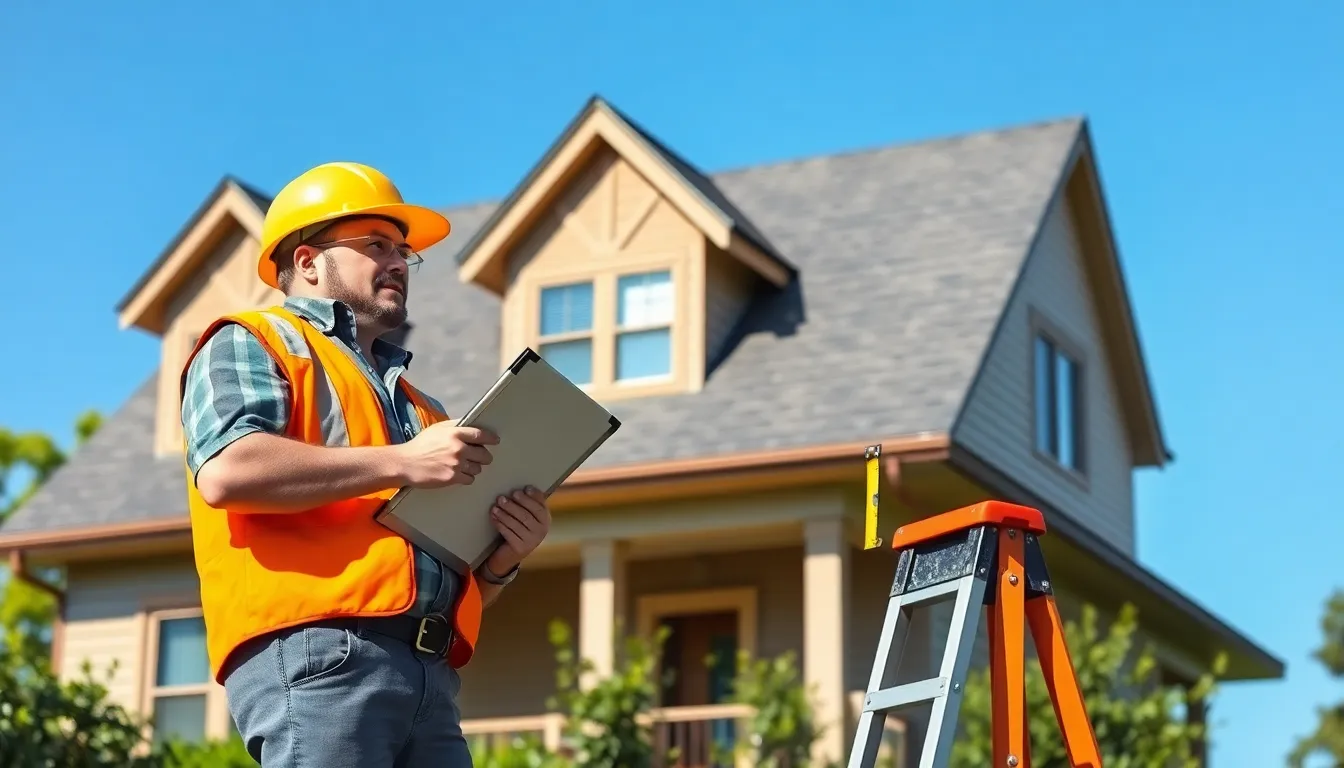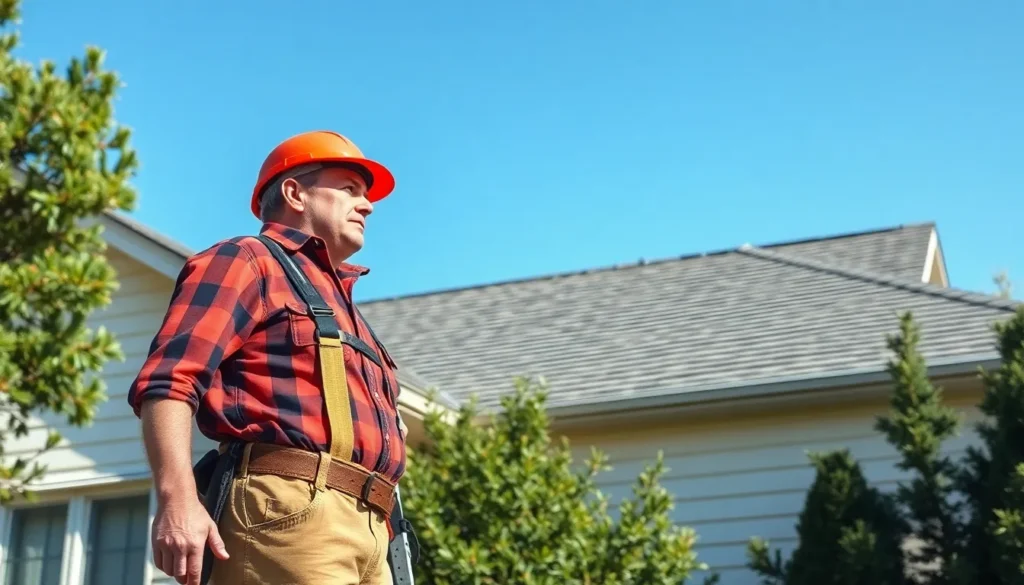Table of Contents
ToggleWhen it comes to home renovations, the roof often gets overlooked—like that one sock that always seems to disappear in the laundry. But a solid roof isn’t just a hat for your house; it’s the first line of defense against the elements. Whether it’s shielding you from rainstorms or keeping your energy bills in check, a roof renovation can save you from a world of trouble—and maybe even a few unexpected indoor waterfalls.
Imagine waking up to a cozy, leak-free home, where the only thing dripping is your morning coffee. Investing in a roof renovation not only enhances your home’s curb appeal but also boosts its value. So why not give your house the upgrade it deserves? After all, a happy roof means a happy homeowner. Let’s dive into the world of roof renovations and discover how a little TLC can go a long way.
Understanding Roof Renovations
Roof renovations play a critical role in maintaining a home’s integrity and aesthetics. Homeowners benefit significantly from investing in this essential aspect of property upkeep.
Importance of Roof Renovations
Roof renovations enhance a home’s protection against harsh weather elements. A sturdy roof minimizes risks associated with leaks and structural damage, resulting in lower energy costs. Improved insulation from a renovated roof increases overall comfort within the home. Many homeowners notice an increase in property value following a roof renovation, as potential buyers appreciate well-maintained roofs. Satisfaction also arises from the aesthetic upgrade, making a home more visually appealing.
Common Reasons for Renovating Roofs
Several factors prompt homeowners to renovate their roofs. Age stands out as the primary reason, with roofs typically needing replacement every 20 to 30 years. Damage caused by storms or fallen trees often makes renovations necessary, addressing compromised structure and safety. Increased energy bills also lead many to consider renovations, indicating poor insulation or ventilation. Homeowners might choose to upgrade materials, opting for more durable or aesthetically pleasing options. Local building codes can drive renovations, as outdated roofs may not meet current safety standards.
Planning Your Roof Renovation

Planning a roof renovation requires careful consideration of various factors to ensure a successful outcome. Homeowners must focus on assessing the current roof condition and setting a realistic budget.
Assessing Your Current Roof Condition
Inspecting the current roof condition is critical. Look for signs of wear such as missing shingles, leaks, or damaged flashing. Detecting structural issues early can prevent larger problems later. Engage a professional roofing contractor for an expert evaluation. They can provide a detailed inspection report, identifying weak spots and recommending necessary repairs. Homeowners should consider the roof age; roofs older than 20 years often need attention. Evaluating these factors helps in making informed decisions about renovation needs.
Setting a Budget for Renovations
Setting a budget ensures the renovation aligns with financial capabilities. Start by researching the costs associated with materials and labor; average roof renovation costs typically range from $5,000 to $15,000, depending on the size and complexity. Allocate funds for potential unexpected expenses; a cushion of 10-20% of the total budget is advisable. Prioritize key renovations; for instance, focusing on materials that enhance energy efficiency can result in long-term savings. Obtaining multiple quotes from contractors aids in determining the best options. Clear budgeting allows homeowners to enjoy a successful roof renovation without financial strain.
Types of Roof Renovations
Roof renovations vary significantly, offering options that cater to different needs and budgets. Understanding these types helps homeowners make informed decisions.
Full Replacement vs. Repair
Full roof replacement involves removing the entire roofing system and installing a new one. This extensive process often occurs when the roof has severe damage or age-related decline. Repair tends to be less costly and simpler, focusing on fixing specific issues like leaks or damaged shingles. Homeowners often choose repairs for minor problems, extending their roof’s life. Full replacements enhance energy efficiency and aesthetics, while repairs maintain current structures. Homeowners should evaluate their roofs closely, knowing when to opt for replacement versus repair can lead to significant long-term savings.
Choosing Materials for Your New Roof
Selecting the right materials plays a crucial role in roof renovations. Asphalt shingles, metal roofing, and tile all offer durability and unique aesthetics. Asphalt shingles remain popular due to their affordability and ease of installation. Metal roofs provide longevity and energy efficiency, making them ideal for various climates. Tile roofs deliver classic looks and last longer, appealing to homeowners focused on design. Homeowners should consider climate, energy efficiency, and budget when choosing materials. Making informed selections leads to enhanced durability and lower maintenance costs.
Hiring a Roofing Contractor
Hiring a qualified roofing contractor is crucial for a successful roof renovation. Professional expertise ensures safety, quality, and adherence to local regulations.
What to Look for in a Contractor
Experience plays a vital role in identifying qualified contractors. Verify their history with similar projects, which indicates reliability and competence. Licensing also matters; professionals should hold valid licenses and insurance to protect homeowners from liability. Check for customer reviews and references, as positive feedback highlights reputable service. Lastly, assess their communication skills; effective communication fosters collaboration and minimizes misunderstandings.
Questions to Ask Before Hiring
Inquiring about warranties is essential; detailed warranties protect investments in new roofs. Discussing project timelines helps set realistic expectations, ensuring the contractor can meet deadlines. Ask for a written estimate, which provides transparency regarding costs and minimizes unexpected expenses. Verify the contractor’s safety measures to ensure compliance with industry standards, promoting a secure work environment. Lastly, determine their payment terms, as understanding financial obligations prevents potential disputes.
Investing in roof renovations is a smart move for any homeowner. A well-maintained roof not only enhances the property’s curb appeal but also safeguards against weather damage and improves energy efficiency. By carefully planning the renovation process and selecting the right materials, homeowners can ensure long-lasting benefits.
Choosing a qualified contractor is essential for achieving a successful outcome. With the right professional guidance, homeowners can navigate the complexities of roof renovations with confidence. Ultimately, prioritizing roof maintenance leads to increased satisfaction and peace of mind, making it a worthwhile investment for any home.







